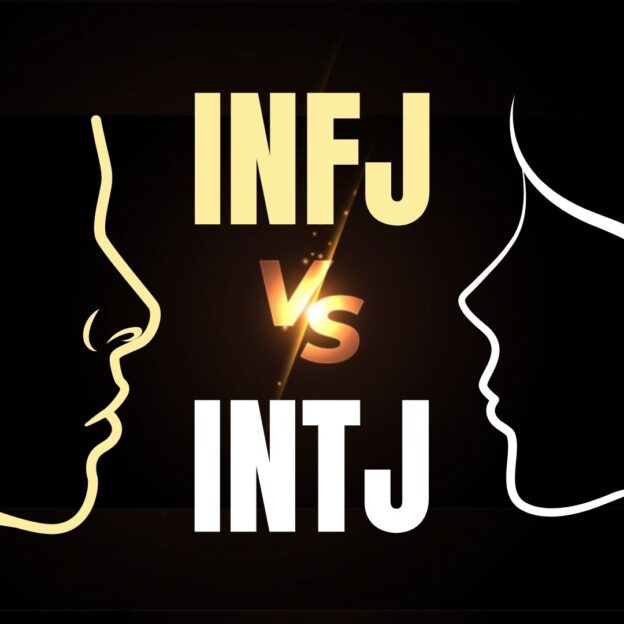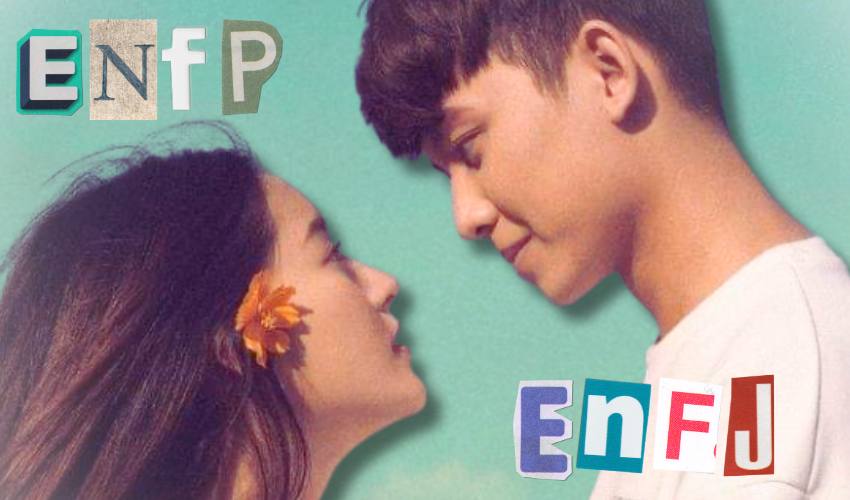The INFJ and INTJ are similar with regard to their penchant for abstract thinking and exploring the deeper meaning and significance of what’s happening around and within themselves. They are forward thinking and tend to make carefully planned decisions with a future goal or purpose in mind. INFJ and INTJ both share a strong vision of what they want out of life and are compelled to invest in their future and to embark on a meaningful and largely self-reliant path to success however they define it.
The INFJ and INTJ differ in their auxiliary functions and this informs how they use their dominant introverted intuition. Due to their auxiliary Extraverted Thinking, INTJ is more concerned with intuiting about impersonal technical matters. They are more interested in working with systems and information that can be acted upon. They like to leverage and devise technical strategies and methods for achieving their goals and objectives.
INFJ by contrast has Extraverted Feeling, which renders a stronger interest in people and society than in technology and data systems. They are curious about what makes themselves and others tick. They are prone towards psychoanalysis and the exercise of trying to figure people out. They often try to empathize and put themselves in other people’s shoes in order to gain perspective about them and their motivations. Despite their independently introverted nature, INFJ is also disposed towards helping and catering to other’s needs and wishes. INFJs have a stronger interest in pleasing others than the INTJ. Moreover, the INFJ can become a mirror of their environment. Their empathetic nature often causes them to adopt and reflect back the energy and feelings that others express.
INTJ’s feeling function is introverted which means that relative to the INFJ, INTJs develop a more personalized set of moral values according to their own sensibilities. This can make them unapologetically contrarian and less willing to sacrifice their personal values in order to oblige others. With tertiary Introverted Feeling, INTJs consult their own feelings and draw their own conclusions when it comes to matters of moral and personal significance. They are more inclined to give advice than to take it from others. However, INTJs generally recognize and support an individual’s right to make their own decisions and deal with the consequences.
INTJs prefer to keep emotion out of their decision process but may often feel the need to reflect and reassess what is and isn’t important for them and prune away the things in their life that are draining their energy and happiness. They are outwardly decisive and self-assured in their opinions. They prefer to be direct but can sometimes come across as insensitive. INFJs on the other hand are disposed towards diplomacy and tact in how they approach others. The INFJ man or woman is ever-cognizant of the effect their words and actions may have on others.
INFJs use introverted thinking as opposed to the extraverted thinking that INTJs use. INFJs therefore, are inclined to also think critically and cultivate technical understanding about why and how things work. Their intellectual curiosity is often directed towards social and psychological areas. INFJs find it rewarding when they can help people directly through acts of service, teaching, advice and friendship. INFJs would like to perform the role of a sage who is valued for their insight, perspective and counsel.
Although INFJs harbor a sense of individuality, they also want to be a part of something bigger than themselves. Community and group consensus are important to them and something they strive to preserve. INFJs are more comfortable with the language of feeling and emotion and are generally more effective than INTJ at reading people and identifying with them. They aim to understand, instruct and inspire others. INTJs for their part are more concerned about understanding and managing their own world. Their own proficiency is their priority and they can be impatient and critical of perceived incompetence in others. They however, also enjoy sharing information on matters in which they feel they wield intellectual authority.
INTJs tend to develop a firmer and more defined sense of who they are and what they want. INFJs by contrast, find it harder to really sort out their own personal feelings. Although they are good at reading others, INFJs can feel they have a lesser grasp on why they do and feel certain things. Because they are so attuned to the feelings and attitudes of others, they can easily lose sight of their own personal issues and laden themselves with the weight of other people’s emotional baggage as though it were INFJ’s burden to bear.
INFJs on the whole, are inclined to display greater tolerance, empathy and quiet warmth towards others. They are active listeners who genuinely care about what people are thinking and feeling. INFJs tend to feel a vested interest in the plight and problems of other people. They are keen on offering support and encouragement and attending to their emotional and physical wellbeing. INTJs present themselves as more objectivistic and emotionally detached. Although INTJ emotions may show through in their face and behavior, they differ from INFJs in that their personal feelings are more resistant to being influenced or affected by those of others.
related posts:
- INTJ Shadow: The Dark Side of INTJ
- The INTJ Personality: What It Means to be the “Architect” MBTI Type
- INTJ Weaknesses: 7 Struggles of Being INTJ
- 35 Signs That You have An INTJ Personality
- 6 Careers INTJs Should Probably Avoid
- 6 High Paying Careers For INTJs
- ISTJ vs INTJ ~ How To Tell Them Apart
- 6 Reasons Why INTJ and INFJ Fall In Love
- INFJ Compatibility with the Rational Types
- INFJ Defined: What It Means to be the INFJ Personality Type
- INFJ in Love: 6 Things To Love About INFJ.
- INFJ strengths: 7 Best Traits of INFJ
- The Dark Side of the INFJ Personality
- 7 Major Weaknesses of the INFJ Personality
- ISFJ and ISTJ in love: 5 Essential Dynamics of their Relationship - February 24, 2024
- ENTP and ENTJ in love: 6 Critical Dynamics of Their Relationship. - February 18, 2024
- ESTJ and ESFJ in love: 4 Key Aspects of their Relationship. - February 12, 2024





